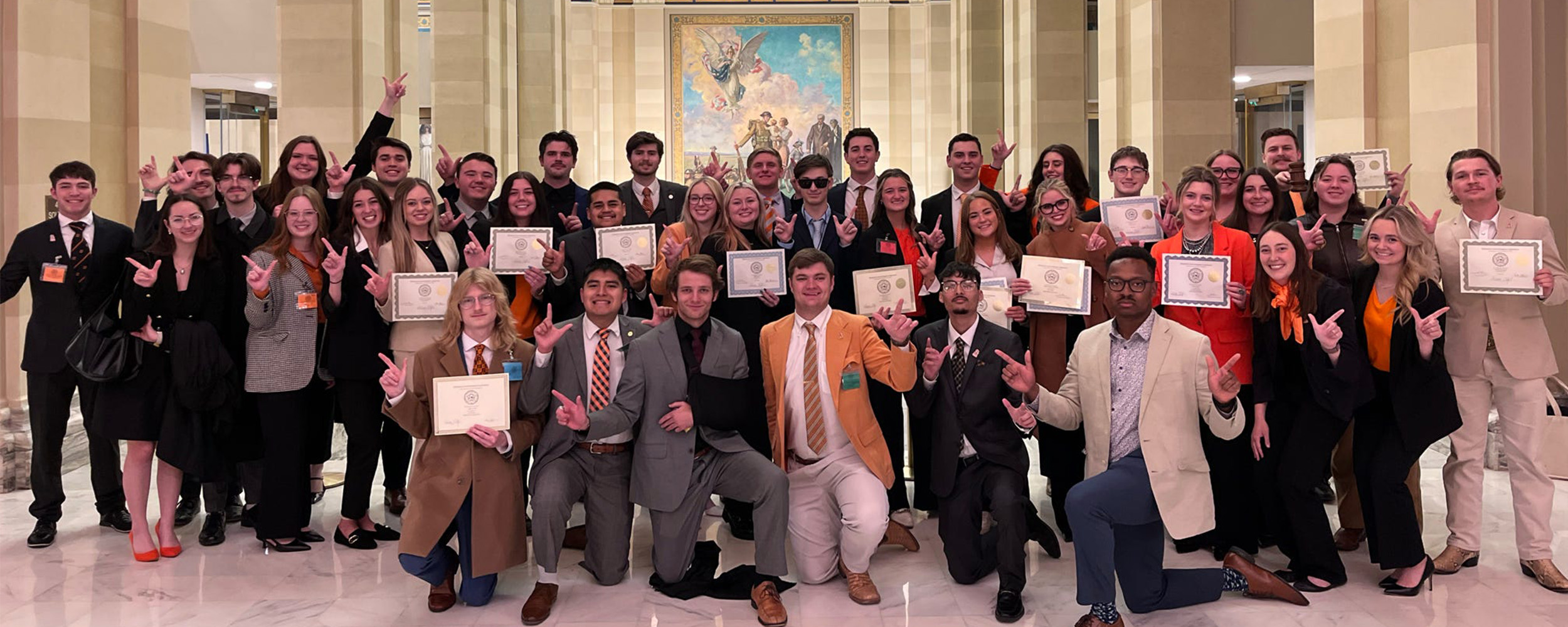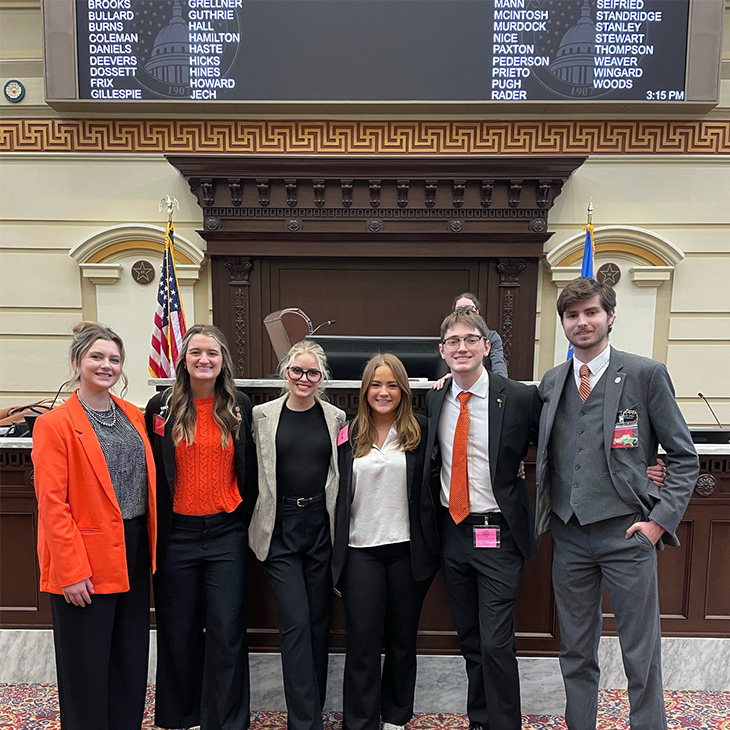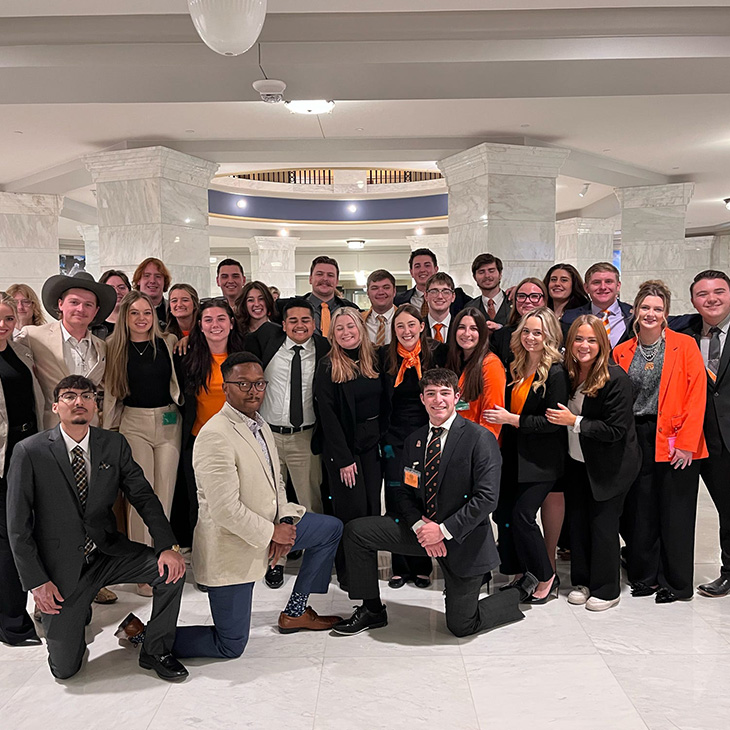
OSU students lead the way at Oklahoma Intercollegiate Legislature
Monday, September 15, 2025
Media Contact: Page Mindedahl | Communications Specialist | 405-744-9782 | page.mindedahl@okstate.edu
At the Oklahoma State Capitol, the House chamber echoes with spirited debate, students rise to present bills, field tough questions and defend their ideas under pressure.
It looks and sounds like state government at work, but the lawmakers are Oklahoma college students, many of whom are wearing orange.

Oklahoma Intercollegiate Legislature, known as O.I.L., is a student-run mock government that replicates the three branches of Oklahoma’s state government. Since its founding in 1969, the organization has offered students statewide a chance to write, debate and pass legislation on issues that matter to them.
For the past five sessions, Oklahoma State University has claimed the title of best overall delegation, a streak that includes besting the University of Oklahoma each time. Nearly 50 Cowboys participate under the guidance of Student Government Association advisor Melisa Echols, making OSU one of the largest and most active delegations in the state.
“It’s a very unique opportunity,” said Ashton Tate, a senior from Mississippi and OSU’s delegation chair. “We’re able to compete inside the actual House and Senate chambers, debate legislation and practice the same processes lawmakers use. It’s as real as it gets.”
Tate oversees OSU’s House delegation while his fellow student leader, Trevor Friesen, directs the Senate. Together, they prepare students to take part in four O.I.L. competitions: House, Senate, moot court and press. Each requires different skills, from crafting policy arguments and handling appellate cases to producing press coverage that documents their work.
Friesen said the experience has shaped his education in unexpected ways.
“I knew almost nothing about government when I joined,” Friesen said. “But through this, I’ve learned how to write legislation, defend it and really think critically about the issues. The competition side keeps it exciting, but it’s the people and the opportunities that make me stay.”
For many students, O.I.L. provides more than a résumé line. The experience often translates into internships, career opportunities and lifelong skills in public speaking, negotiation and collaboration. Some bills passed through O.I.L. even make their way to elected officials for consideration.
Tate said his own path in politics has been influenced by the organization. Through O.I.L., he earned an internship with the Mississippi Attorney General’s Office, where he helped draft programs around veteran suicide prevention and police K-9 support.
“I love policy work,” Tate said. “Writing legislation and piecing the puzzle together is fun. This program has given me the chance to do that in a real way.”
Friesen echoed that sentiment, noting that while he may not head to law school, the lessons learned in O.I.L. will carry into any career.

“It’s given me an interest in corporate government affairs or even lobbying. I wouldn’t have found that without O.I.L.” Friesen said.
O.I.L. is housed under OSU’s SGA, giving the program the support and resources to thrive. Weekly meetings prepare students with workshops on bill writing, public speaking and debate. The structure reflects OSU’s land-grant mission of broadening access to education and preparing students from all backgrounds to lead in their communities.
“We really promote breadth of academic and political backgrounds,” Friesen said. “You don’t have to be a political science major. We drop people into the deep end, but they learn quickly, and they grow a lot.”
As OSU looks to the next session this November, Tate and Friesen are focused on continuing the university’s tradition of leadership at the Capitol. But more than awards, they see O.I.L. as a place where students learn to listen, disagree respectfully and work toward solutions.
Those lessons, Tate said, may be the most important of all.
“Whether or not we go into politics, the skills we learn here — respect, communication, collaboration — they stick with us forever,” he said.
